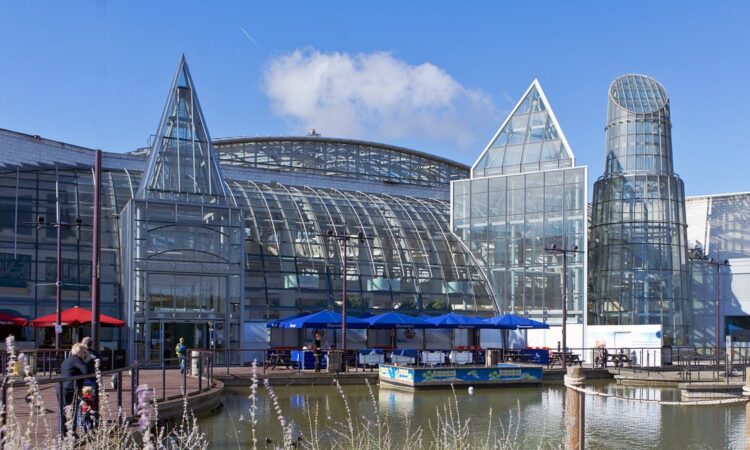
- Land Securities owns the Piccadilly Lights and Bluewater shopping centre
- The FTSE 250 company’s net assets declined by £625m to around £6.4bn
Land Securities nearly halved its losses last year despite interest rates continuing to dampen real estate values.
The commercial property developer, which owns the Piccadilly Lights and Bluewater shopping centre, revealed pre-tax losses slumped by 45.2 per cent to £341million in the 12 months ending March.
Its net assets declined by another £625million to around £6.4billion, having fallen by more than £900million the previous year, after further base rate hikes by the Bank of England.
Landsec’s Central London portfolio sank by 6.9 per cent in value, with its offices registering a 13.9 per cent drop.
Higher rates have caused significant pressure on valuation yields and much lower transaction activity across international commercial property markets.
Valuations have been further depressed by companies reducing their office footprint since the Covid-induced surge in hybrid working, especially in London and other major cities.
Adam Vettese, analyst at eToro, said: ‘The firm has had to battle these challenges by optimising their portfolio, disposing non-performing assets.’
Last week, Landsec announced the sale of its hotels business for £400million to investment firms Ares Management and EQ Group in order to ‘focus its resources on areas where it has genuine competitive advantage.’
This follows the company recently selling two small retail outlets, a couple of leisure assets, a retail park, and the West 12 Shopping Centre in Shepherd’s Bush, London.
However, Landsec said yields and asset values are starting to stabilise amid hopes of future interest rate cuts and improving demand.
It noted that about 60 per cent of its portfolio was ‘effectively stable’ in the latter half of the period, while overall yields remained steady during the final quarter.
Vettese added: ‘The firm will be hoping that this week’s softer-than-expected inflation print in the US gets us one step closer to kicking off rate cuts, which can’t come soon enough as refinancing of cheaper debt acquired pre-2022 remains a hurdle to overcome.’
Mark Allan, chief executive of Landsec, said the stabilisation of rates and rental growth is ‘starting to attract increased investor interest for the best assets.’
He added that the firm’s sale of over £600million of assets in the past seven months had given it ‘meaningful capacity to invest in high-quality assets that add to our best-in-class portfolio at what we believe to be an attractive point in the cycle.’
Oli Creasey, property analyst at Quilter Cheviot, warned that while ‘management have made some relatively optimistic statements,’ there are concerns that ‘it is a little too early to call the precise bottom of the market, particularly for Landsec.’
He added: ‘[Landsec’s] portfolio is around 50 per cent in London offices and mixed-use urban developments – assets whose values fell most in 2024 (-6.5 per cent / -14 per cent respectively), and where the outlook remains cloudy.’
Land Securities Group shares were 2.6 per cent down at £6.72 on early Friday afternoon, making them one of the FTSE 100 Index’s five biggest fallers.
Some links in this article may be affiliate links. If you click on them we may earn a small commission. That helps us fund This Is Money, and keep it free to use. We do not write articles to promote products. We do not allow any commercial relationship to affect our editorial independence.






